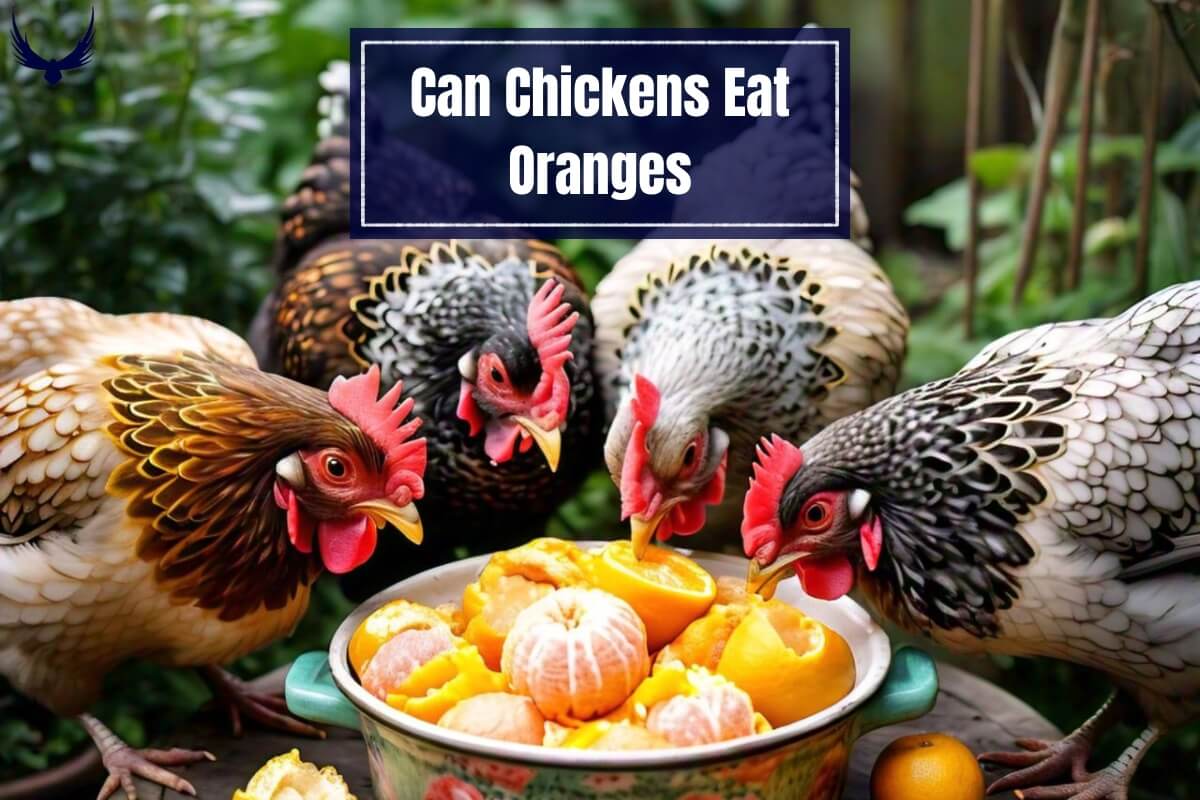Backyard chicken keeping has become increasingly popular with many farmers and hobbyists enjoying the fresh eggs and companionship these birds provide. Chickens are known to have diverse diets including grains, insects, and various plants.
It’s natural for owners to wonder about expanding their feathered friends’ menu. One common question that arises is Can Chickens Eat Oranges?.
In this article, we’ll explore the benefits and risks of feeding oranges to chickens, helping you make an informed decision about including this citrus fruit in your flock’s diet.
Can Chickens Eat Oranges?
Chickens can eat oranges safely in moderation. Oranges provide vitamins, particularly vitamin C, and antioxidants that can benefit a chicken’s health and immune system. Oranges should be given as an occasional treat rather than a regular part of their diet.

The high acidity and sugar content of oranges means they should be fed sparingly. It’s best to offer small pieces of orange flesh without the peel or seeds. Remember that a balanced chicken feed should remain the main component of their diet.
Nutritional Benefits of Oranges for Chickens
Here’s a detailed guide on the nutritional benefits of oranges for chickens, broken down by key components:
Vitamins
- Vitamin C: Oranges are a rich source of Vitamin C. It strengthens the immune system. Vitamin C also helps manage stress and improves eggshell quality in chickens.
- Vitamin A: It supports eye health and improves feather quality. It also supports reproductive health in chickens.
- B-Complex Vitamins (B1, B6): These Vitamins promote better metabolism and support nervous system function in chickens.
Minerals
- Calcium: It strengthens bones and eggshells. It also aids in muscle function in chickens.
- Potassium: Potassium in oranges regulates fluid balance in chickens and helps with muscle contractions.
- Magnesium: It contributes to bone health and assists in energy production in chickens.
Antioxidants
- Flavonoids: Oranges are rich in Flavonoid which protect chicken cells from damage and reduce inflammation.
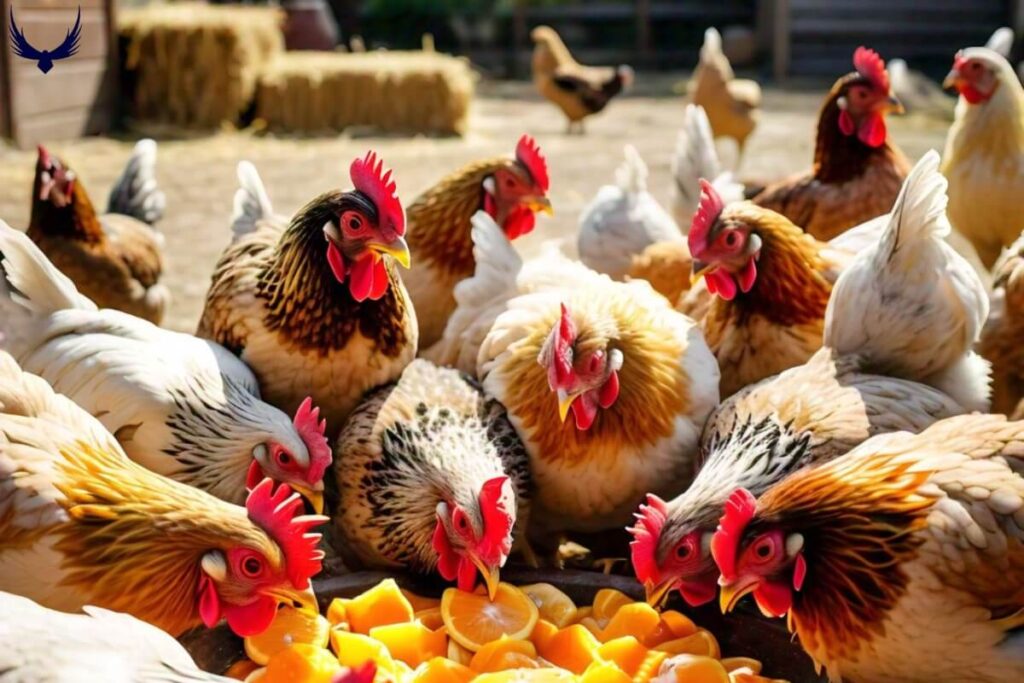
- Hesperidin: It is Bioflavonoid that supports heart health in chickens and has anti-inflammatory properties.
- Beta-Cryptoxanthin: It promotes overall health and supports egg yolk color in chickens.
Fiber
Pectin (type of fiber) helps in digestion, lower cholesterol and promotes gut health.
Which Parts of Oranges Can Chickens Eat?
Here’s a detailed guide on which parts of oranges chickens can eat:
Flesh (Pulp): The juicy, fleshy part of the orange is safe and enjoyable for chickens to eat. This is the main part of the fruit that contains most of the vitamins and minerals. Chickens can easily peck at the pulp and like to enjoy its sweet taste.
Peel (Skin): Chickens can eat orange peels, but they may not find them as appetizing as the flesh. The peel contains additional fiber and some nutrients. It’s best to offer peels in small pieces to prevent choking.
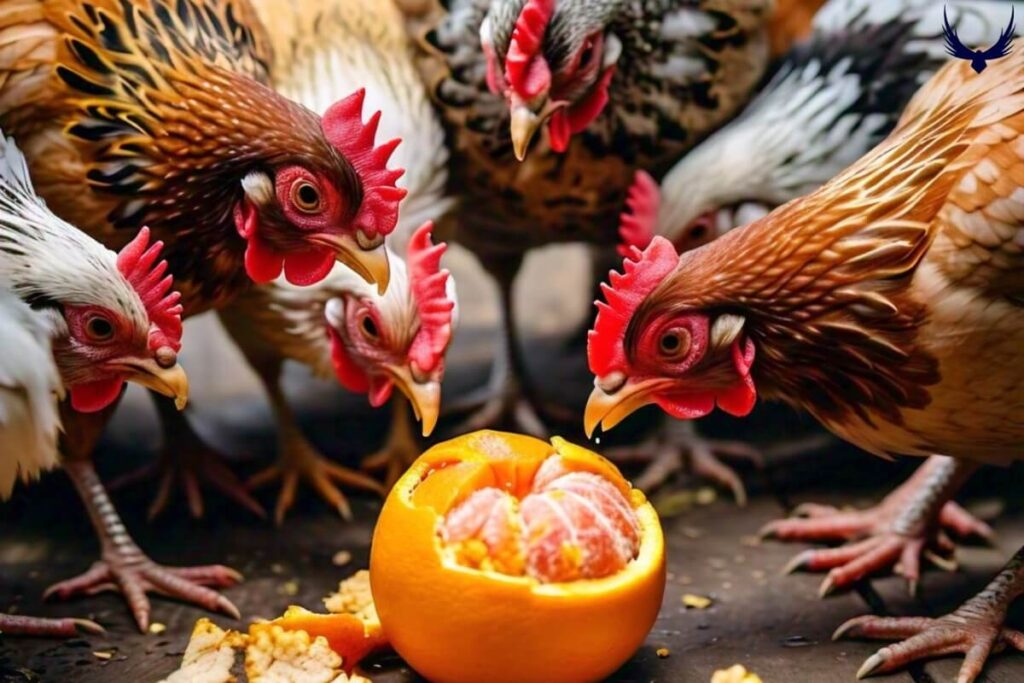
Pith (White Part): The white, spongy layer between the peel and the flesh, known as the pith, is safe for chickens to eat. It contains additional fiber and some nutrients.
Seeds: Orange seeds are not safe for chickens as they contain small amounts of cyanide. It’s best to remove seeds before feeding oranges to chickens.
Membranes: The thin membranes that separate orange segments are safe for chickens to eat. These parts contain some fiber and won’t harm your chickens if consumed along with the flesh.
How to Feed Orange to Chickens?
Here’s a detailed guide on how to feed oranges to chickens:
Preparation
Before feeding oranges to your chickens, wash them thoroughly to remove any pesticides or contaminants. You can use cool water and gently scrub the surface.
If oranges are non-organic, peel them to avoid any chemical residues. Cut the orange into smaller pieces to make it easier for them to eat and to prevent choking.
Serving Methods
Serving Whole Segments: One simple method is to separate the orange into its natural segments. These bite-sized pieces are perfect for chickens to peck at. You can scatter these segments in chicken coop, which encourages natural foraging behavior.
Chopped Orange Pieces: You can chop the orange segments into smaller pieces. This method allows you to distribute the treat more evenly among your flock and ensures that even smaller chickens can enjoy the fruit without struggling with larger pieces.
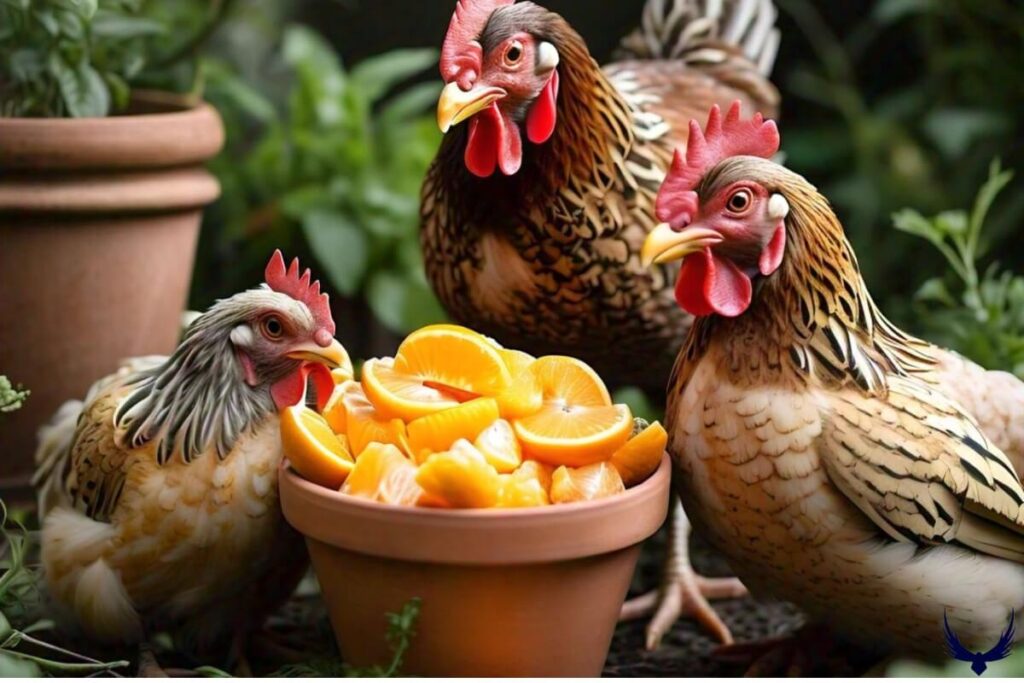
Orange Peel Strips: If you want to offer the peel, cut it into thin strips. Some chickens might enjoy pecking at these, though many may ignore them.
Mashed Orange Pulp: You can mash the orange pulp. This can be helpful for younger chicks or older chickens that might have difficulty with whole pieces. You can serve the mashed pulp in a shallow dish or mix it with their regular feed for added flavor and nutrition.
Frozen Orange Treats: In hot weather, consider freezing orange segments or pulp in ice cube trays. These frozen treats can help to keep chickens cool while providing hydration and nutrients.
Mixing Orange with Other Foods: Oranges can be mixed with other chicken-safe fruits (Kiwi, Strawberries, Bananas, Pineapple, and Grapes), vegetables (Celery, Broccoli, Jalapenos, and tomatoes), or grains to create a varied treat. This can be useful if you’re trying to use up small amounts of different foods.
How Often Can Chickens Have Oranges?
Here’s a guide on how often chickens can have oranges:
Frequency
Oranges should be given to chickens as an occasional treat. Offer oranges once or twice a week at most. This ensures your chickens enjoy the nutritional benefits without overindulging in sugary fruits.
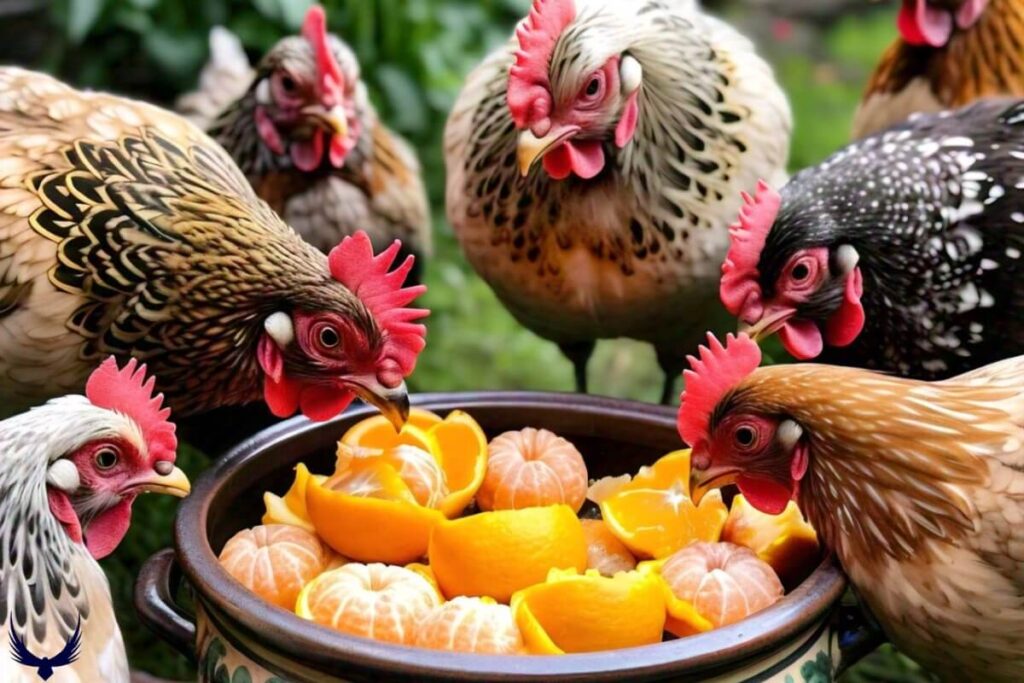
Quantity
The amount of orange to give depends on your flock size. A general rule is to offer about 1 to 2 small orange segments per chicken. For a flock of 10 chickens, one medium-sized orange divided among them is sufficient.
Seasonal Considerations
You can increase orange treats slightly during hot summer months for extra hydration. In cooler seasons, maintain the usual moderation. Always observe your chickens’ reactions and adjust accordingly.
Risks of Feeding Orange to Chickens
Following are the risks of feeding oranges to chickens:
Digestive Problems: Overfeeding oranges can lead to digestive upset in chickens, causing diarrhea or loose droppings. The high acidity and sugar content might irritate their digestive system if consumed in large quantities.
Nutritional Imbalance: Excessive orange consumption may lead chickens to eat less of their regular, balanced feed. This can result in nutritional deficiencies, as oranges alone don’t provide all the nutrients chickens need for optimal health.

Allergic Reactions: Some chickens might rarely be sensitive to citrus fruits. Watch for signs of allergic reactions such as difficulty in breathing, swelling, or unusual behavior after introducing oranges to their diet.
Choking Hazard: Large pieces of orange peel or whole segments can pose a choking risk for smaller chickens or chicks. Always cut oranges into appropriate sizes to prevent this danger.
What Things to Consider Before Feeding Orange to Chickens?
Following things should be kept in mind while feeding chickens:
Pesticide Exposure: Always wash oranges thoroughly before feeding them to chickens to remove pesticide residues. Consider using organic oranges to minimize chemical exposure. If using non-organic oranges, peeling them is a good practice to further reduce the risk of pesticide ingestion.
Mold and Rot: Inspect oranges carefully for any signs of mold or rot before offering them to your chickens. Even small amounts of mold can be harmful to chickens and can cause respiratory issues or other health problems. Discard any oranges that show soft spots, discoloration, or visible mold growth. Fresh oranges are the safest option for your flock.
Can Baby Chicks Eat Oranges?
Baby chicks should not eat oranges until they are at least 1 month old. At this age, you can introduce very small amounts of finely chopped orange flesh as a treat. Start with tiny pieces, about the size of a grain of rice, and offer no more than a teaspoon per chick.
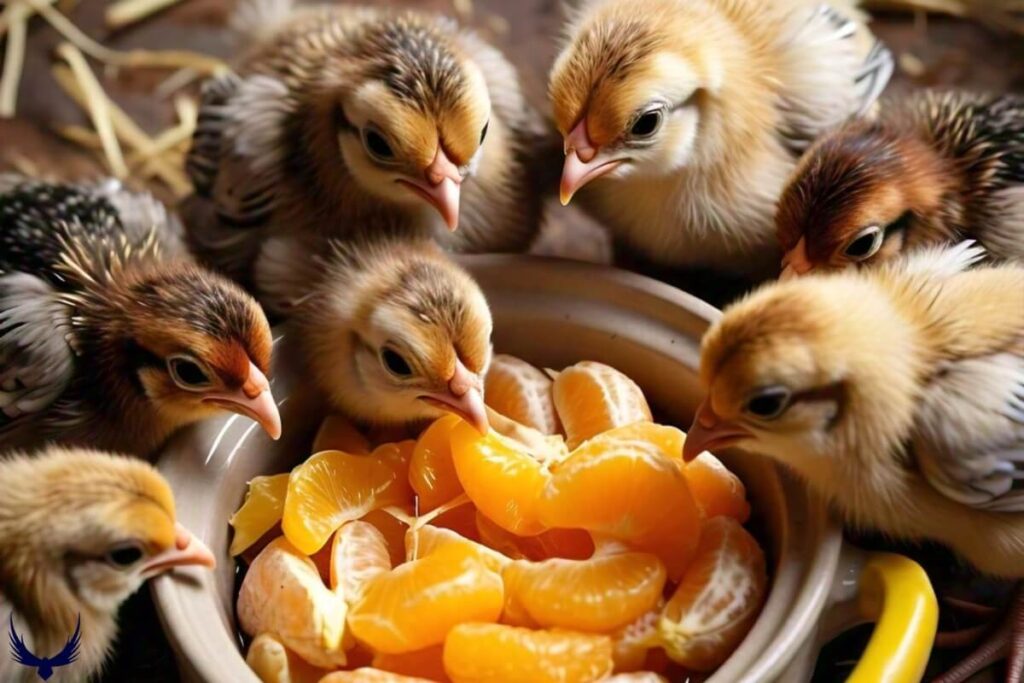
Always ensure that chicks have access to their regular chick feed, as this should make up most of their diet. Introduce new foods gradually and watch for any digestive issues.
Related Post: Can Chickens Eat Mushrooms?
Can Chickens Eat Orange Peels?
Chickens can eat orange peels. The peels are safe and can provide some nutrients, but they’re tough and bitter.
It’s best to offer orange peels in small amounts, chopped up, along with other foods. Most chickens will prefer the juicy fruit part of the orange instead.
Can Chickens Eat Mandarin Oranges?
Chickens can eat mandarin oranges. These small, sweet oranges are safe and more appealing to chickens than larger oranges.
These fruits provide vitamins and antioxidants that can boost chickens’ immune systems and overall health. Like other citrus fruits, offer mandarins in moderation.
Can Chickens Eat Tangerines?
Chickens can eat tangerines which offer similar benefits to oranges. Tangerines provide vitamins C and A, as well as some fiber. These nutrients can support immune health and overall well-being in chickens.
Do Chickens Like Oranges?
Many chickens like oranges, especially the sweet, juicy parts. Preferences can vary among individual chickens. Some may eagerly peck at orange slices, while others might show less interest. Offering small amounts can help you see if your chickens enjoy them.
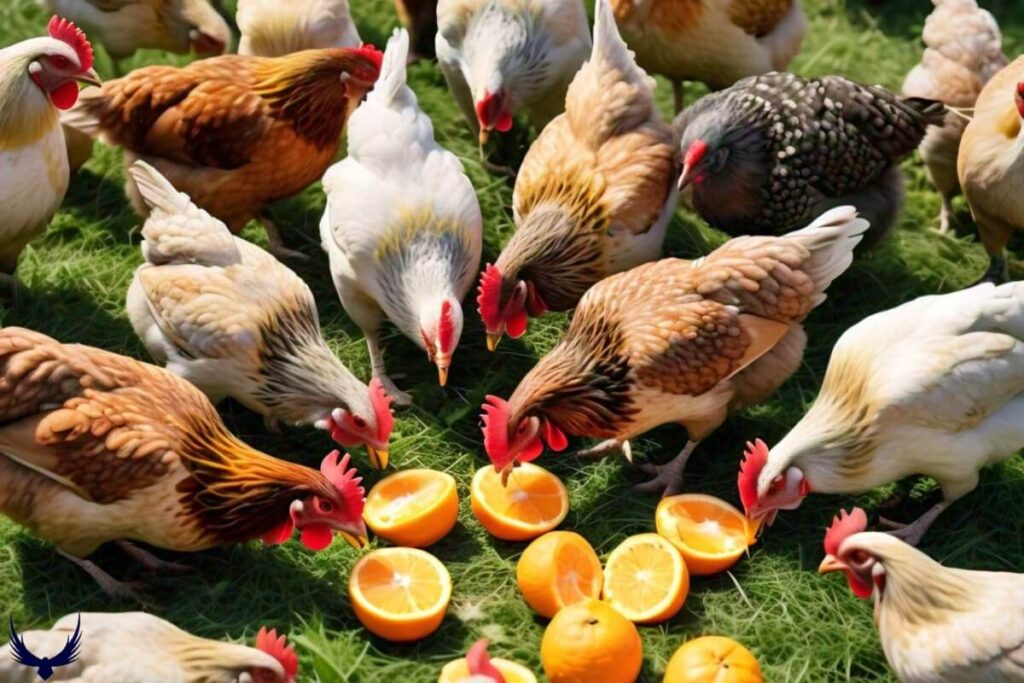
You can also check name list for Black Feathered Friends.
Are Oranges Safe for Chickens?
Oranges are generally safe for chickens when fed in moderation. The fruit part is safe and can be a healthy treat. Avoid giving them orange seeds, which contain small amounts of cyanide.
Also, limit the amount of peels offered, as they’re tough and less nutritious.
FAQs – Do Chickens Eat Oranges?
Can Chickens Eat Orange Seeds?
Chickens should not eat orange seeds as they contain small amounts of cyanide, which can be harmful. It’s best to remove seeds before feeding oranges to chickens.
Can Chickens Eat Orange Peels Everyday?
Chickens shouldn’t eat orange peels every day. Offering peels occasionally as part of a varied diet is fine, but daily consumption isn’t recommended. Too many peels might upset their stomachs or replace more nutritious foods.
Can Chickens Eat Orange Slices?
Chickens can eat orange slices safely. Offer slices in moderation as a treat, removing any seeds first. Orange slices can be a refreshing snack for chickens on hot days.
Can Chickens have Oranges and Lemons?
Chickens can have both oranges and lemons, but in moderation. Oranges are more appealing due to their sweetness. Lemons are very acidic and should be offered sparingly. Remove seeds from both fruits and introduce them slowly to see how your chickens react.
Can Chickens have Oranges and Apples?
Chickens can safely eat both oranges and apples. These fruits provide different nutrients and can be part of a varied diet. Apples are more popular with chickens. For both fruits, remove seeds and cut them into small, manageable pieces before offering.
Can Chickens have Orange Juice?
Chickens can have small amounts of orange juice, but it’s not ideal. The juice lacks fiber and is high in sugar. Fresh orange slices are a better choice as they provide the whole fruit’s nutrients. If offering juice, dilute it with water and give it only as an occasional treat.
Can Chickens Eat Orange Rinds?
Chickens can eat orange rinds which are the outer colored part of the orange peel. Rinds are not harmful, but they are bitter and tough, so chickens may not enjoy them much. Chop rinds into small pieces if offering them to chickens.
Can Chickens Eat Orange Pulp?
Chickens can safely eat orange pulp, which is the juicy, fleshy part of the orange. This is the most appealing part of the orange for chickens. It provides vitamins and can be a healthy treat in moderation.

